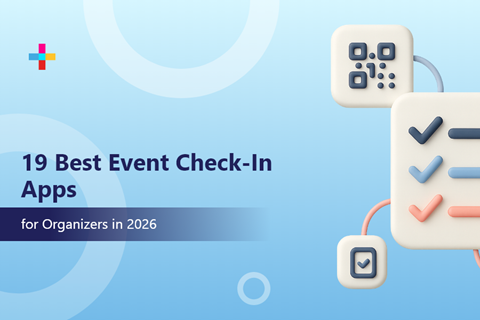

Hybrid events took the events industry by storm when the pandemic subsided. The increasing shift toward it has been well documented and they have turned into proven weapons to enhance attendance and widen a brand's audience base. However, hybrid event planning can feel a bit challenging, especially to new planners. It needs you to stretch your creativity, strategize execution, measure, and seamlessly integrate virtual and in-person experiences.
Today, with greater emphasis on sustainability, hybrid events are being looked upon as the best solution to deepen bonds with the target audience and provide personalized experiences without increasing the carbon footprint. In this blog, we'll help you understand the key elements of hybrid event planning.
Define Your Goals and Align the Costs
Hybrid events are usually organized to enhance reach. You should be clearly aware of the goal of such events as they have direct impact on the cost . If your goals are not well defined, your event budget will be ruined in no time. Moreover, setting up the right goals will help you track and measure your success metrics.
Your goal could be to increase brand awareness, get more social press mentions, receive coverage from popular publications, or to generate leads and increase sales.
After defining hybrid event objectives, decide on the budget. The key areas where you should focus include shared costs, such as:. These include:
In order to make the hybrid event cost-effective yet successful, spend your budget on what matters the most. It means the elements that will meet your goals. For most planners, it typically includes the in-person venue and the virtual events platform, speakers, attendee engagement activities, and rewards.
Choose a Feature-Rich Virtual/Hybrid Event Platform
Choosing the ‘correct’ platform is crucial since there will be virtual audience participation along with in-person audiences. Go for a platform that offers seamless technology integration with tools like interactive live streaming, virtual lobby, multiple breakout rooms, virtual booths for sponsors, high-quality audio-video along with on-demand cloud storage. These features are vitally important to create events that are ROI driven and impactful. Consider these as hygiene factors in choosing a virtual/hybrid event platform.
Before finalizing any platform, ask for a demo. This way you can see if the platform offers you everything you are looking for. Eventcombo offers a free demo of its virtual events platform. The tailored walk-through enables planners to understand how to use it for setting up the best attendee experiences.
Market the Hybrid Event for Maximum Attendance
Hybrid event marketing is essential if you want to make your hard work come to fruition. It begins with a well-designed event website and landing page that will function as the first touchpoint for attendees. This website should be mobile and technically optimized to increase accessibility. Keep it updated with accurate event details for both categories of attendees. Your website should have attractive visuals, videos, clear CTAs to register, and, if possible, user-generated content from past events.
Next, you want to leverage social media and search engines to promote hybrid events. This is an important part of planning hybrid events, and you should begin it in around earnest around two months before the event. Promote your event organically with paid options like sponsored LinkedIn, Facebook, and Instagram posts.
If you haven't thought of starting an email campaign, this is the perfect time. Do you know that email ROI is $36 for every dollar spent? Use event technology like Eventcombo's all-in-one event management platform to set up an email marketing campaign. Make sure you create two different campaigns to promote hybrid events for in-person and virtual attendees.
Another effective marketing strategy is creating special sessions with your event's speakers, exhibitors, and other attendees. This fosters a greater familiarity with the event and allows attendees to know whom they will listen to in the event.
A hybrid event offers a great opportunity to incentivize the audience by promoting different types of tickets. You can use event ticket pricing strategies like all-inclusive tickets, early-bird tickets, VIP tickets, and more, d marketing them on various platforms.
Plan Interactive Hybrid Event Content
Maximizing engagement in hybrid events becomes difficult if you don't have engaging content. Content like polls, surveys, and games according to your event's theme ensures that both categories of attendees are thoroughly engaged.
You will need to stream your event's speakers, performers, and sessions for virtual attendees. Use a virtual events platform to record those sessions and share them afterward. The content should give unique experiences to in-person and virtual attendees.
Some examples of engaging content for in-person attendees include:
Some examples of engaging content for virtual attendees include:
Note that gamification, in the form of polls, Q&A, badges, and scavenger hunts can be a part of both in-person and virtual events. This makes gamification a great inclusion to any hybrid event.
Use an event mobile app for attendees to facilitate your hybrid event engagement ideas. Eventcombo's mobile event app keeps attendees engaged with interactive agendas and tailored schedules, networking tools, and gamification.
Set up a Robust Hybrid Event Planning Team
Hybrid events deliver two distinct experiences. The very nature of this type of event makes it essential for event planners to create and coordinate two different teams, one that will take care of virtual attendees and the other for in-person attendees.
On the virtual side, you should have the following professionals:
On the in-person side, the team should have the following members:
Meet All Your Hybrid Event Planning Goals!
Nearly 70% of event professionals believe hybrid events to become integral to engagement strategies in the future. Combining the power of both virtual and in-person experiences contribute significantly in promoting the accessibility and reach of your events. If you have decided to make it a part of your brand building strategy this year, planning it carefully is essential. Use this guide to navigate through the process slowly but consistently. With the aid of an expert team who is mindful of the shared goals and robust event technology, you'll be able to surpass the challenges seamlessly.

Professional certifications for event planners do more than provide a solid foundation in the field; they offer valuable exposure to the dynamic world of event planning and insights from prominent industry experts.

Choosing the right event management platform is vital for event professionals navigating the growing demand for in person , virtual, and hybrid events. Modern planners need solutions that offer robust features,...

Attendees don't notice good check-in. They only notice bad check-in. And planners know check-in is the first moment where their behind-the-scenes work gets exposed.